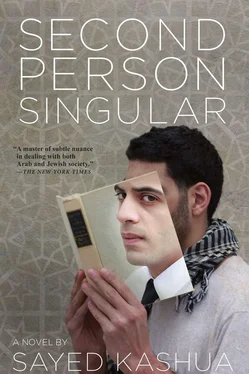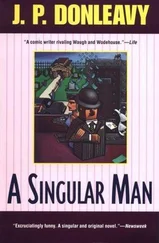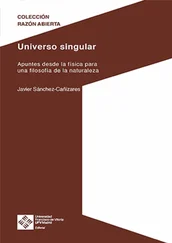The lawyer looked at the cherrywood-and-wire-framed clock on the wall, a housewarming gift from the accountant and his wife. His wife had said she’d be home in an hour. Or maybe that she’d leave Diana’s place in an hour. He wasn’t sure. As far as he could tell, though, an hour had passed. If she was leaving now, she’d be home in fifteen minutes.
The lawyer got up off the leather couch, moving as slowly and smoothly as possible, trying to limit his body’s movements to the bare minimum and checking that his son’s eyes remained closed. Treading lightly, he walked through the living room to the bedroom and, supporting his son’s neck, lay his head on the pillow in the crib and then let the rest of his body follow. The baby opened his eyes for an instant and then shut them again, and the lawyer covered him with a thin blanket and returned to the living room to transfer his daughter to her brother’s room.
“In the name of Allah, the most merciful and compassionate,” he found himself mumbling, as his mother did, as all Muslim women do when they lift a child in their arms.
The notion that his wife would come home to a house of sleeping children was satisfying to the lawyer. She’d come home and smile and when she realized she didn’t have to put the kids to sleep, she’d give him a little kiss. After that they’d have a glass of wine and climb into bed. Maybe they’d even shower together, like they used to do, long ago.
He took his briefcase and went down to the study. He lit a cigarette and knew his wife would be home before he had the chance to finish it. Would he hear her coming in? He was tense. He didn’t want to miss the expression on her face when she realized that they’d have the night to themselves. But even if he didn’t hear her come in, she’d definitely come down to the study to find him, kissing him in his office chair.
The lawyer did not want to open the briefcase. He did not want to see that damned note or The Kreutzer Sonata or any of Yonatan’s books. He exhaled a long plume of smoke. The whole thing was probably just an awful misunderstanding. When she got home, he’d show her the note and she’d laugh and say, “Where did you get that thing?” and tell him the whole ridiculous truth. But the lawyer couldn’t really imagine an explanation that would put him at ease. Maybe she had written it for him and somehow it had wound up in the pages of Tolstoy’s novella. “Oh, my God!” he heard her laugh like a little girl, holding the note in two hands like a scroll, reading it and then remembering the circumstances under which it had been written. An honest reaction that would leave no room for doubt. Maybe something like, “Wow, I wrote this to you back when I was still in school and as soon as I wrote it, your sister came into the library, so I shoved it into the first book I found. How did you find it? I looked for the book forever. The librarian must have come by with that little wagon and taken all the books off the table.”
That was not a likely scenario. Maybe she’d have a different explanation. Perhaps Yonatan was a colleague who had asked her to translate the sentence into Arabic for him. Or maybe she had written it to someone else before the lawyer had met her. But the notion of her having an Arab boyfriend before they met made the lawyer wince and ruined his peace of mind. He breathed deeply and tried to remember all the conversations he’d had with his friends, in which he bragged how enlightened he was and how he would not mind marrying an Arab girl who’d been in a prior relationship. He even remembered exactly what he had said to his friends, most of whom had always said they would never marry a nonvirgin, even though some of them had spent years together with Arab girls whom they called girlfriends, but who were clearly only playthings because, as they said, she who had relinquished her honor once would relinquish it over and over again.
At the time he had disdained those friends, particularly because they hid the fact from their girlfriends, sometimes for years, that there would come a time that they would unceremoniously dump them. What are you going to do, they would say, we weren’t the ones who popped the cherry. But if she’d had a prior relationship, why hadn’t she told him? He would have forgiven her. But would I have? he wondered. Yes, if she had been straight with me, then yes. But she had not been. And what kind of relationship had it been? Had she slept with him and then had her hymen restored before the wedding? Had she faked the blood on their wedding night? And if she hadn’t slept with the other guy, what would he think? If all they did was kiss? Or hold hands? Or write each other love letters?
The lawyer shook himself free of those thoughts and tried to restore the calm he had felt when he learned that she had in fact gone to her friend’s house. He decided that when she came home he’d simply give her the note and see how she reacted, see if her explanation seemed plausible. After all, he knew his wife and he knew there was no way she had cheated on him. No way.
The lawyer put his cigarette out in the ashtray. He thought he heard a noise coming from the upper floor. He rolled his chair over to the door, opened it a crack, and listened. “Leila,” he said softly, but there was no response. She hadn’t come home yet. He considered taking a shower, perhaps even getting out before she made it home, but didn’t like leaving the kids alone, especially the little one. He could wake up at any second and start howling and no one would hear him. But mostly he didn’t want to miss the moment when his wife came home. More than anything else he wanted to see that smile, the one that would explain it all away, promising that everything was okay, that nothing had changed.
According to his calculations she should have been home already. But the lawyer figured that once she’d heard that he had picked up the kids she had decided it was all right to stick around at Diana’s, chatting a little more with her friends. He would not call her. He did not want to be one of those men that are always checking up on their wives and are stingy with their free time. She’d be home any minute. Even though he’d sworn he wasn’t going to look at the briefcase, the books, or the note, he couldn’t resist. Just the books, he told himself. The first was a book of drawings by an artist named Egon Schiele. The lawyer flipped through the book and looked at the crooked, distorted coal drawings of nudes. He went through it quickly and wondered if the artist was someone serious or just some unimportant fringe painter. How does one tell? The lawyer didn’t like the drawings much but he knew he didn’t know anything about art and as he browsed he felt a familiar ache. He Googled the artist and saw that he was an important figure. I wonder what Yonatan does for a living, he thought, and then tried to impose the artist’s name on his memory. Egon Schiele, Egon Schiele. Another scrap of information that could help him fill the glaring gaps in his education, especially in so far as art was concerned. He recalled how a colleague had once said to him in court, “Don’t tell me you don’t know who Chekhov was?” And that recollection led him to another earlier but no less painful one, from back in his college days, when a Jewish student had discovered that he had never heard of the Rolling Stones. He, of course, resorted to the technique he had learned from other Arab students, who employed it often, and responded with a question that was meant to underscore the cultural divide, “Why, how many Fairuz songs do you know? Do you have any idea what Al-Mutanabbi wrote?” And yet he had felt a sharp twinge of inferiority.
He looked at the signature on the first page of the art book again, Yonatan, and only then turned his attention to the other book. It was One Hundred Years of Solitude, by Gabriel García Márquez. The lawyer had heard of the author and the book. Maybe this was his chance to read it. He flipped through the pages. He stopped for a moment and made sure that the sounds he heard were not coming from the upper floor of the house and then looked at the signature again before closing the book. He went back to the Egon Schiele book and opened it to the signature page. Something didn’t add up. The same word was written in the same place, in a similar style, but the lawyer felt that the signatures were different. He left both books open to the signature page and took The Kreutzer Sonata out of his briefcase. The signature on that one was more like the one on One Hundred Years of Solitude. Those signatures were written in bigger letters and, though they were written with different pens, he was sure that they were identical. Something must have been bothering Yonatan when he penned his name in the Schiele book, the lawyer thought.
Читать дальше












